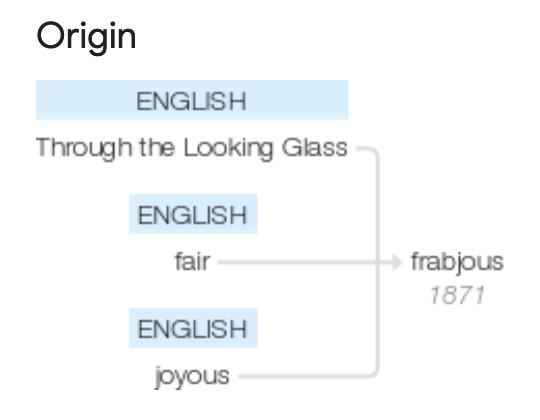Frabjous
Seeking joy over happiness
Who will tell whether one happy moment of love or the joy of breathing or walking on a bright morning and smelling the fresh air, is not worth all the suffering and effort which life implies.
Erich Fromm
audio narration by David Marlow
Definition.
frabjous1 (adj.)
delightful; joyous.
wonderful, elegant, superb, or delicious.
Frabjous is about embracing joy, the parts of life that are wonderful, elegant, superb, or delicious. Of course, any examination of joy starts with happiness. Are joy and happiness the same thing?
In simplest terms, joy is deeper than happiness.
Happiness, at its root, means good fortune and being in advantageous circumstances. In languages as diverse as Greek to Irish, most of the originating words for happy were related to luck.
When things are going well, we are happy; when they aren’t, we are less so and perhaps even unhappy.
Joy is much deeper and far less dependent on circumstances. The Greek word for joy, ‘chara’ represents inner gladness and delight.
It isn’t dependent on outside circumstances, coming instead from the point of gratitude and grace.
Experiencing Joy isn’t about being problem free.
Joy is letting go of the fear of those problems, not the problems themselves.
Risk
Happiness is not bad or wrong. Focusing solely on happiness over deeper, more spiritual, and long-lasting parts of our lives poses risks and limitations.
Here are some points to consider when describing these risks:
Short-lived Gratification: Temporary happiness is often derived from external sources such as material possessions, social recognition, or fleeting experiences. It is prone to fading quickly once the source of happiness diminishes or changes. This constant pursuit of momentary gratification may lead to a cycle of seeking new and superficial stimuli over deeper more long-term experiences.
Vulnerability to Adversity: Relying on temporary happiness makes us more susceptible to the ups and downs of life. Conversely, joy provides resilience and the ability to find meaning even in difficult times.
Dependency on External Factors: Pursuing temporary happiness often involves seeking external validation, material possessions, or approval from others. This dependency on external factors for happiness can lead to a sense of insecurity and a constant need to maintain these conditions.
As well as a host of other risks from developing shallow relationships to feeling a lack of purpose and a disconnect from the spiritual.
Relying solely on seeking happiness without recognizing the importance of deeper, spiritual, and long-lasting elements of joy can result in a superficial existence with potential emotional and spiritual drawbacks.
Opportunity🌀
There is a connection inherent in joy that is absent in happiness alone. Connection to others, to nature, to a higher power or purpose.
When we embrace harmony by appreciating the fleeting moments of happiness while actively seeking those frabjous moments of joy, we cultivate a fulfilling and enriched life.
Joy stems from a profound sense of inner contentment and fulfillment, which is not dependent on external circumstances and starts with gratitude.
“If the only prayer you said in your whole life were, “thank you,” that would suffice.”
Meister Eckhart
This lasting contentment can provide a stable foundation for navigating life's challenges with grace and resilience.
It is stable in part because it assumes gratitude for what we have and not for the fleeting things of happiness. Such joy enables resilience and emotional strength in the face of the inevitable disappointments and setbacks of life.
Striving and ambition while not bad on their own can drown out the voice of purpose in our lives when they become our primary focus.
Seeking a sense of purpose and meaning in life is aligned with joy and interestingly enough opens more doors or opportunity than striving and ambition.
Story
The year I turned 40 my career skyrocketed.
After a decade at GE when they were the biggest and most successful company in the world, I was recruited away to become an executive running a technology division that processed 20% of all the financial transactions in the US.
That’s the Network Operation Center I ran in the photo below.
Overnight I received invitations for consulting, opportunities to deliver keynotes at global conferences, and more money than I could have dreamed of even a few years before.
To say I was ‘happy’ would have been an understatement.
It would have been easy to focus exclusively on my career and moving ever upward. I was likely only a few successes away from a chance at CIO at this or a similarly large company. From that point, a Fortune 500 CEO job was not out of the question.
Instead, I continued to work hard while maintaining harmony in my life. I enjoyed the ‘happy’ part of this success while cultivating and growing stronger relationships with my friends, and family.
My sons were starting high school and my daughter elementary. I coached their teams and or attended all of their events.
Making sure there was time for frabjous events was part of the plan.
The ‘Green Door’ in Alice in Wonderland was inspired by the green door in the photograph above. I took that picture at Christ Church College in Oxford.
I was in England to chaperone my son’s choir trip. I took 10 days off work from that highly important job to spend time with my son.
No one in my role had EVER taken any time off without being immediately reachable. I didn’t take a phone to London.
I did it by setting up systems, processes and developing people on my team who could operate without me.
Systematizing opportunities for joy was key for me and will be for you as well.
Application.
I gave up some career opportunities to cultivate what brought me joy.
When we focus on our Ikigai, we nurture habits, activities, attitudes, and approaches that support relations, connection, and deeper meaning.
It’s not an either-or. We can and should pursue happiness. As long as those attempts at happiness are in harmony with investing in the joy areas of our lives.
🌀 Remember: No matter what has come before, today is a fresh start. 🌱
Let’s make things a little bit better. 🌱
You can learn more about Ikiquest+ here.
For Plus subscribers, you can access your Ikiquest+ resources here.
Need help creating your Ikiverse? Explore 1-on-1 coaching here.
1871: coined by Lewis Carroll in Through the Looking Glass, apparently to suggest fair and joyous. Also noted the ‘Green Door’ in Alice in Wonderland was inspired by the green door in the photograph that I took at Christ Church College in Oxford.
Lewis’ room at Oxford overlooked this garden with a view of the door. https://www.alice-in-wonderland.net/resources/analysis/story-origins/









Even if the objective was the pursuit itself, I still don't agree with it. I wonder if, because of the context of the times, even basic happiness was not considered a valid entitlement.
Absolutely the best commentary I've heard on joy v.s. happiness! *while I am in pursuit of both - joy is where strength resides. 😊 Thank you for sharing your joy journey.❤